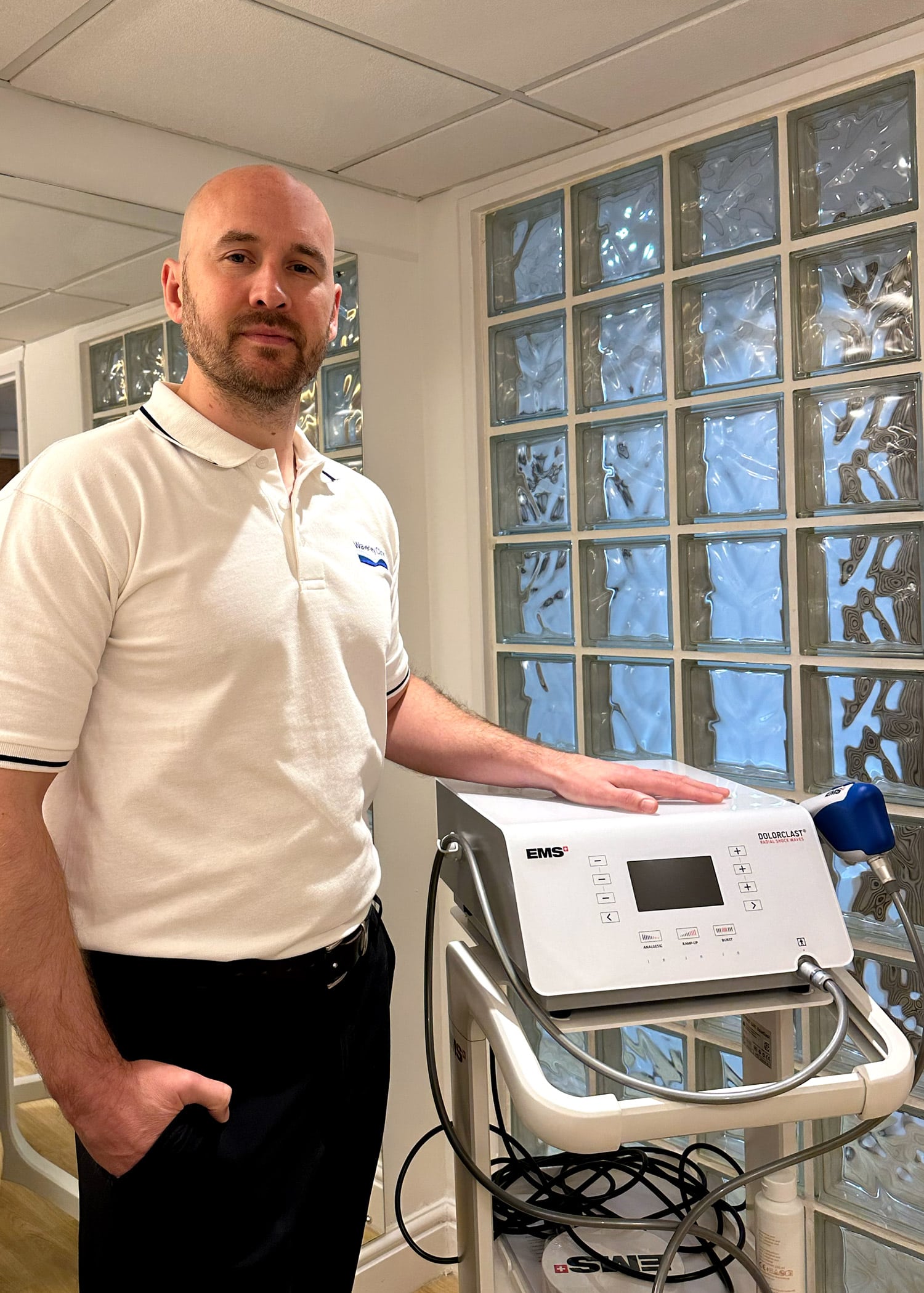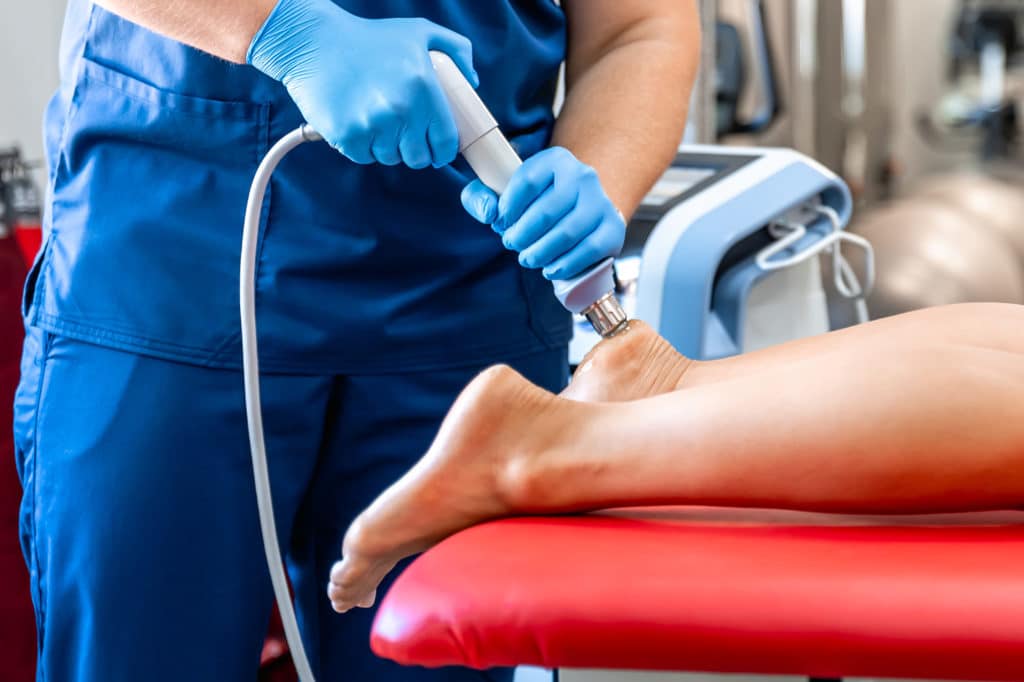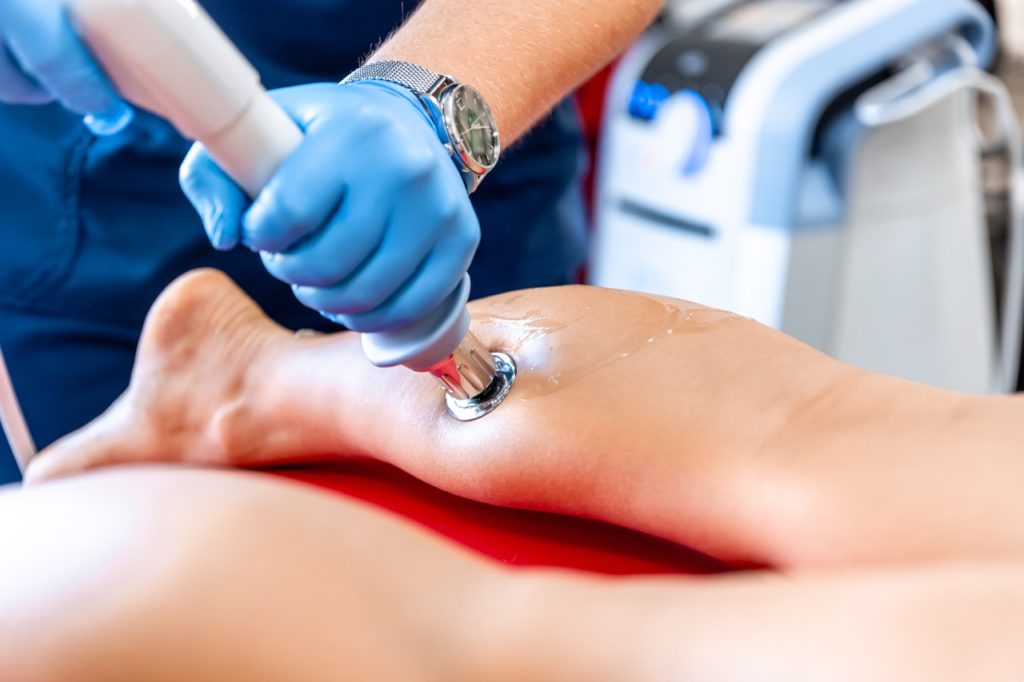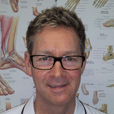Shockwave therapy is a safe and effective treatment that can be used to treat a range of soft tissue injuries. It is primarily used to treat long-standing injuries in tissues that are very slow to heal due to poor blood supply, such as tendons. Shockwave therapy enhances blood circulation to injured tissues, aiding in the healing process by activating stem cells and producing pain-reducing enzymes.
Injuries to these tissues can persist for a long time, but shockwave can help speed up the healing process by improving blood flow to that area and restarting your body’s natural recovery. Additionally, shockwave therapy stimulates the body’s natural healing process, making it an effective complement to rehabilitation exercises.
Let’s look a little deeper at what is shockwave therapy actually is and how it can help your injury…
Definition and explanation of shockwave therapy
Shockwave therapy, also known as extracorporeal shockwave therapy (ESWT), is a non-invasive treatment that uses high-energy shockwaves to stimulate the healing process in injured tissues. This innovative therapy is administered through a handheld device that delivers radial shockwaves directly to the affected area. By promoting blood flow and stimulating the body’s natural healing process, shockwave therapy targets the root cause of pain and inflammation. This focused treatment is highly effective for various musculoskeletal conditions, offering a promising solution for those suffering from chronic pain and slow-healing injuries.

How does shockwave therapy work?
Shockwave therapy is a non-invasive treatment that uses pulses of energy targeted to the injured tissue. The treatment increases blood flow to the affected area and stimulates cellular repair whilst also helping to reduce the pain.
There is an abundance of research showing shockwave therapy’s effectiveness in treating a wide variety of injuries over a much quicker period of time than just conventional treatment alone. Shockwave therapy is often considered a conservative treatment option before more invasive procedures.

Benefits of shockwave therapy
The benefits of shockwave therapy are numerous and well-documented. Some of the most significant advantages of this treatment include:
- Fast and effective pain relief: shockwave therapy has been shown to provide significant pain relief in as little as one treatment session.
- Non-invasive: unlike surgical or injection-based treatments, shockwave therapy is a non-invasive procedure that does not require any incisions or injections.
- Stimulates blood flow: shockwave therapy promotes blood flow to the affected area, which helps to stimulate the healing process and reduce inflammation.
- Improves soft tissue function: shockwave therapy can help to improve the function of soft tissues, such as tendons and ligaments, which can become damaged due to injury or overuse.
- Cost-effective: shockwave therapy is a cost-effective treatment option compared to other forms of treatment, such as surgery or injection therapy.
These benefits make shockwave therapy an attractive option for those seeking a safe, effective, and affordable solution for their musculoskeletal issues.
What injuries can be treated with shockwave therapy?
Evidence has been very positive in improving the recovery of several injuries, particularly those that are notoriously very slow to heal. These include plantar fasciitis, Achilles tendonitis, tennis elbow, golfer’s elbow, frozen shoulder and tendonitis in the hip, knee and shoulder.
Combining shockwave therapy with physical therapy can enhance recovery and expedite the return to normal activities.
Suitability and precautions
Shockwave therapy is suitable for a wide range of musculoskeletal conditions, including plantar fasciitis, Achilles tendinopathy, and tennis elbow. However, there are some precautions to consider before undergoing shockwave therapy. These include:
- Pregnancy: shockwave therapy is not recommended for pregnant women, as the effects of the treatment on the fetus are not yet fully understood.
- Cancer: shockwave therapy is not recommended for patients with active cancer, as the treatment may stimulate the growth of cancer cells.
- Blood clotting disorders: patients with blood clotting disorders, such as haemophilia, should not undergo shockwave therapy, as the treatment may increase the risk of bleeding.
- Pacemakers or other implantable devices: patients with pacemakers or other implantable devices should not undergo shockwave therapy, as the treatment may interfere with the functioning of these devices.
By understanding these suitability factors and precautions, patients can make informed decisions about whether shockwave therapy is the right choice for their specific condition.
Shockwave treatment at Waverley Clinic in Farnham, Surrey
James Leyland, our resident physiotherapist here at Waverley Clinic, now offers shockwave treatment to patients as part of the rehabilitation process. This treatment is a non-invasive alternative for those who are looking for relief from their musculoskeletal conditions.
He is an experienced and skilled clinician and uses state-of-the-art shockwave therapy equipment to deliver targeted and effective treatment to our patients. He works closely with each patient to create individualised treatment plans that address their specific needs and help them achieve optimal results.
Don’t let chronic pain or slow-healing injuries hold you back any longer. Consider shockwave therapy as a safe and effective option for treating your musculoskeletal issues at Waverley Clinic physiotherapy today!
So, book an appointment today, call us on 01252 716611

How long does the shockwave treatment take?
Each treatment is quick, so you will only need 15-minute appointments. Most long-term injuries require one session a week for three consecutive weeks.
Do I need a referral?
If you are planning on using health insurance to cover your treatment, you will need to contact them prior to attending to ensure that you are covered. Otherwise, you can simply refer yourself for shockwave treatment, assuming you have been advised that this is an appropriate treatment for you. It may be necessary to be assessed by a physiotherapist first to ensure that shockwave is appropriate for your condition if you have not been directly referred by a consultant or doctor.
Will I feel better immediately?
In general, most people feel much better after the three sessions, but healing will carry on for up to four months afterwards, so it can take longer to feel the benefits.
Shockwave is designed to stimulate your body’s natural healing process, so how quickly your body responds will be completely individual. In general, most people feel much better after the three sessions, but healing will carry on for up to four months afterwards, so it can take longer to feel the benefits.
Is shockwave therapy painful?
Shockwave will often feel uncomfortable as the energy waves are designed to take your tissues back to an acute stage where optimal healing can happen. The discomfort is only there during the treatment session, and the machine can be adjusted if the intensity is too much.
Do I need to be aware of anything after the session?
It is recommended that you allow the tissue to settle for 24-48 hours after each session, even though it usually feels perfectly fine to function as normal. You can still do gentle movement, but should avoid strenuous activities or exercises. You should not ice the area or take anti-inflammatories for 48 hours after the session, as this will counteract the effects of the shockwave treatment.
Once the 48 hours have passed, you can carry on as normal.
Schedule your shockwave therapy session with James at Waverley Clinic today
Shockwave therapy is a safe and effective treatment option for a variety of musculoskeletal conditions. With its non-invasive nature and minimal side effects, it has become a popular choice for those seeking relief from chronic pain and slow-healing injuries. Combining shockwave therapy with physical therapy can also enhance recovery and expedite the return to normal activities.
See the positive results for yourself and experience relief from your musculoskeletal issues. Don’t let pain or slow-healing injuries hold you back any longer – take the first step towards healing with shockwave therapy at Waverley Clinic. Schedule your appointment with James, our skilled physiotherapist, today.
Call us at 01252 716611. Our phone lines are open 24/7.
We look forward to helping you on your journey towards recovery and optimal health.

